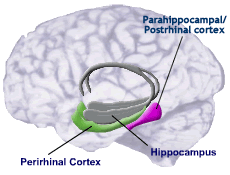Why do I only remember certain things in certain places? I'm glad you asked, because this happens to me all the time. I'll think about something, get off the couch and go to the kitchen to do whatever I told myself I needed to do, then completely lose my train of thought. Why did I come in here, anyway?
 |
| Man Vyi (Wikimedia Commons) |
Funny enough, psychologists have actually studied this.
In a
2011 paper, Gabriel Radvansky and colleagues from the University of Notre Dame had participants play a computer game. In a virtual room, they were instructed to pick up an object from a table and take it to another table. The objects varied in color and shape. Importantly, as long as the participant was "carrying" the object, it was invisible to them.
Sometimes the participants' video game characters simply had to cross the room to put the object down. Other times, they had to walk through a virtual doorway to get to the table.
At random times throughout the experiment, participants were asked what object they were currently carrying. Interestingly, walking through a virtual doorway resulted in less accurate and slower responses than when they simply needed to cross a room.
 |
| MetroParent |
But why? The authors suggest that we keep information in our
working memory for as long as we consider it relevant. But when something related to the context of our memory changes — like the room we're in when we think about something — the memory must no longer be important enough for us to remember. Our brains probably think they're helping out by purging that memory for us. This is consistent with the hypothesis that, in general, recently-formed memories are
extremely vulnerable to many interfering forces if they have not yet had a chance to consolidate.
To answer the broader question: we associate certain memories with certain places, and that's how we make sense of all the input flooding into our noggins. Our brains have
incredible storage capacity, but they can only do so much. (
Elephants* never forget, though.)
Do you forget more
When you walk through a door?
Let us know
In this anonymous poll!






